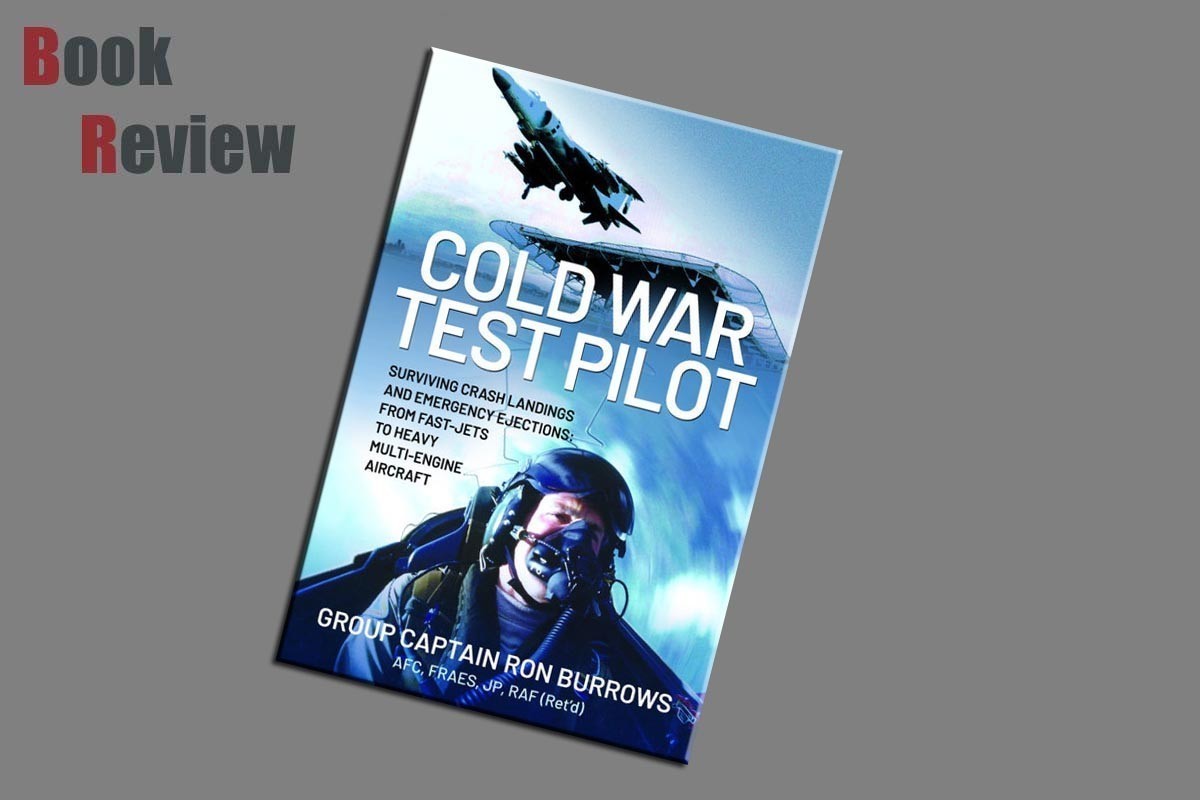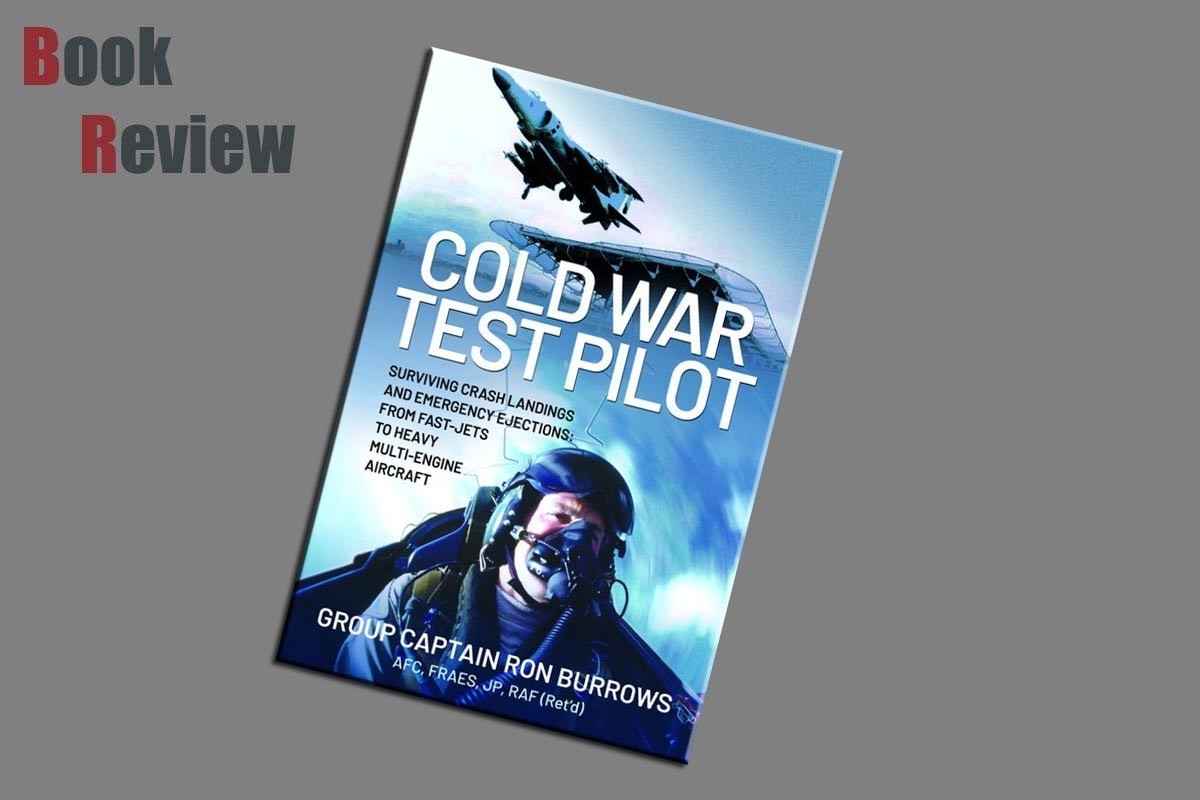
Introduction
The following introduction is taken from the Pen and Sword website:
The Falkland Islands had been invaded and a Task Force was already steaming south at full speed. On board the carriers were the Harriers that would provide essential aerial cover for the British troops and ships sent to re-capture the islands. They would be entering particularly hostile territory, and the type’s capabilities had urgently to be expanded and proved. This was a job that Ron Burrows and the test pilots of his elite Fighter Test Squadron at Boscombe Down were ready to take on.
From the 1960s through to the 1990s, Ron test-flew all of the RAF’s fast-jets of the era, in the process of which he survived two crash landings and two emergency ejections, as well as numerous other close shaves. A master of his craft, he rose to become the Aeroplane and Armament Experimental Establishment’s chief test pilot – and this is his remarkable story.
With four test flying tours under his belt and close-air-support missions flying Hunters in the Aden Emergency, Ron’s experiences extended throughout the critical final decades of the Cold War. Ron was a graduate of the US Navy’s test pilot school and in his long career he has flown an unusually broad range of US and UK aircraft from fast-jets to heavy multi-engine aircraft.
With his unrivalled knowledge and expertise, Ron is able to explain the methods, techniques, and demands of his profession, with many examples of what can and often does go wrong in aircraft development and testing. His descriptions of his near misses and catastrophic accidents are written with colour and candour. But he also tries to inform the reader about the skills required to fly and test fast-jets and about the development of cockpit displays and design, highlighting some of the issues and problems encountered in development and in operation. ‘If it could go wrong, it will go wrong’ could be the subtitle of this frank and witty account which flies along with the speed of one of those fast jets.
Review
This offering from Air World is a hard backed book, provided for review courtesy of Pen and Sword. The contents are provided over 175 pages of matt paper, with a small photographic section in the middle. The author of the book is Group Captain Ron Burrows, a person that I know personally. The contents of this title are as follows:
Chapter 1 My father, Squadron Leader Steve Burrows DFC; No 44 (Rhodesia) Squadron, and the Avro Lancaster B1
Chapter 2 Flying, training and the De Havilland Vampire
Chapter 3 RAF Chivenor and the Hawker Hunter; No 43 (Fighter) Squadron’s Close Air Support Operations in the Radfan Mountains; The Aden Emergency and RAF Khormaksar
Chapter 4 Engine Failure over the dessert, and a Martin Baker let down
Chapter 5 Ferrying a Clapped out Hunter from Aden to the UK
Chapter 6 Aden Airways and flying the Douglas DC3 in the Hadramaut
Chapter 7 Instructing an Oxford UAS and at the Central Flying School, RAF Little Rissington
Chapter 8 The United States Naval Test Pilots School; The F 8K Crusader and YOV 1 Mowhawk Incidents
Chapter 9 The A4B Skyhawk, Engine Fire and a Parachute descent over the Chesapeake
Chapter 10 The Aeroplane and Armourment Experimental Establishment at Boscombe Down: Early MRCA Cockpit development and Buccaneer Hot weather trials in Arizona
Chapter 11 A Second test flying tour: Hot weather testing; Martel TV Missile trials; The De Havilland Sea Vixen and the Gloster Javelin; Jaguar Weapons Systems accuracy trials
Chapter 12 Jaguar Cold Weather trials in Canada; MRCA First Flights and the near demise of the first prototype.
Chapter 13 MRCA First Official Preview; The MRCA P-05 Accident and Pilot Induced Occilations
Chapter 14 The NATO MRCA, management agency, and Tornado head up display development
Chapter 15 The National Defence College; Defence Operational Requirements, Branch MOD; and a Return to Boscombe Down as CO of ‘A’ (Fighter Test) Squadron
Chapter 16 The Falklands Conflict; Test flying the production Tornado, and Tornado Automatic Terrain following Trials; Ski jumping the Harrier; In Flight re-fuelling trials of Hercules C1 (K) and Vulcan B2 (K); Surviving a crash in the Westland Scout
Chapter 17 The MOD Procurement Executive; Return to Boscombe Down as Chief Test Pilot and Superintendent of the Test Flying and Flight Test Training Division
Chapter 18 Leaving the RAF; Instructing at the Oxford Air Training School and becoming the Principle of the International Test Pilots School
Chapter 19 Aircraft Accidents and the Loss of Good Friends and Colleagues in a Dangerous Profession
Epilogue
This title looking at the life of Group Captain Ron Burrows, is written in an informative manner that is also unassuming. He does not tell of his progression, but in a matter of fact way gives an insight into the direction his career took. It gives you a look at the risks involved in such a career and if it was not for the luck of the devil, could have seen his life come to an end on more than one occasion. Knowing Group Captain Ron Burrows personally, I’m sure he won’t mind me saying that he is a down to Earth and un-assuming individual, who despite his flying of just about anything the British and Americans could put in the air, he has no airs or graces. I have had many enjoyable conversations and he always has a ditty to put a smile on your face or make you stop and think, and it is with those attributes of the man that I feel the contents of this book have been presented in. I will add that being lucky enough to know this man, that this book could be far thicker and in much more depth then is presented here, but that does not detract from an enjoyable read.
Conclusion
This offering from Group Captain Ron Burrows gives you an insight into the man and his career. Being lucky enough to be training this person in a new voluntary role, means that many of the stories related in this book have been given to me by the authors mouth, and despite that I still found the book an enjoyable read that is informative at what a career in the RAF could encompass during the golden years of the jet age. If you are ever in the Salisbury area of Wiltshire, and have a chance to visit the Boscombe Down Aviation Collection based in an old WW1 airfield, you may be lucky enough to meet this unassuming man, as he is also a volunteer there.





























